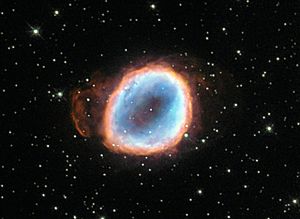Stellar wind facts for kids

A stellar wind is like a constant breeze of gas and tiny particles that blows away from the outer layers of a star. Think of it as the star "breathing out" a stream of its own material into space. Different types of stars have different kinds of stellar winds, some are gentle, and others are incredibly powerful.
Contents
What is Stellar Wind?
Stellar wind is made up of charged particles, mostly protons and electrons, that are moving very fast. These particles get enough energy from the star's heat and light to escape its gravity and fly off into space. It's a bit like steam rising from a boiling pot, but instead of water, it's the star's gas.
How Stellar Winds Form
Stars are incredibly hot, and this heat makes the gas in their outer layers expand. The energy from the star's light also pushes on these gas particles. When the push is strong enough, the particles can escape the star's pull and stream outwards. This continuous flow of particles is what we call a stellar wind.
Types of Stellar Winds
The strength and speed of a stellar wind depend a lot on the type of star it comes from.
Our Sun's Wind: The Solar Wind
Our own Sun has a stellar wind, which we call the solar wind. It's a steady flow of charged particles that travels through our solar system.
- The solar wind is relatively gentle compared to winds from other stars.
- It travels at speeds of about 400 to 800 kilometers per second (250 to 500 miles per second).
- When the solar wind reaches Earth, it interacts with our planet's magnetic field, creating beautiful auroras (like the Northern and Southern Lights) and sometimes affecting satellites and power grids.
Winds from Massive Stars
Much bigger and hotter stars, especially those that are very bright and blue, have extremely powerful stellar winds.
- These winds can be millions of times stronger than the Sun's wind.
- They can blow away a lot of the star's material very quickly.
- These strong winds play a big role in how these massive stars live and eventually die.
Winds from Dying Stars
When stars like our Sun get old and are nearing the end of their lives, they also produce strong stellar winds.
- These winds push away the star's outer layers, forming beautiful clouds of gas and dust called planetary nebulae.
- The image at the top of this article shows a planetary nebula created by such a wind.
Why are Stellar Winds Important?
Stellar winds are not just interesting; they are very important for understanding stars and even how galaxies change over time.
- Shaping Space: They can carve out huge bubbles in the gas and dust between stars, creating new areas where new stars might form.
- Star Evolution: For massive stars, stellar winds can cause them to lose a lot of their mass, which affects how they evolve and what kind of explosion they might have when they die.
- Planetary Atmospheres: Stellar winds can affect the atmospheres of planets, especially those close to their stars. For example, the solar wind can slowly strip away parts of a planet's atmosphere over billions of years.
Images for kids
 | Aaron Henry |
 | T. R. M. Howard |
 | Jesse Jackson |


